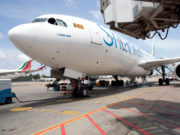Lithium Batteries, Safety Oversight
UPS Faces Proposed Penalty for Allegedly Improper Battery Shipment
The U.S. Federal Aviation Administration (FAA) is accusing UPS of violating hazardous materials regulations by…
Viewing 1 - 10 of 30 results
Lithium Batteries, Safety Oversight
The U.S. Federal Aviation Administration (FAA) is accusing UPS of violating hazardous materials regulations by…
by AeroSafety World Editorial Staff
The U.S. Federal Aviation Administration (FAA) wants to change airworthiness regulations that govern fire protection…
by FSF Editorial Staff
Cabin Safety, Lithium Batteries, Cargo Safety
The U.S. Department of Transportation (DOT) is moving to prohibit the transportation of lithium ion…
by FSF Editorial Staff
News, Lithium Batteries, Dangerous Goods
Bag manufacturer calls new restrictions an ‘absolute travesty’
by FSF Editorial Staff

News, Lithium Batteries, Dangerous Goods
American Airlines and Delta Air Lines both have announced restrictions on passenger-carried “smart bags” that…
by FSF Editorial Staff

News, Lithium Batteries, Smoke Fire Fumes
SriLankan Airlines is praising cabin crewmembers for their handling of an in-flight fire Sunday aboard…
by FSF Editorial Staff
News, Lithium Batteries, Dangerous Goods
Qatar Airways passengers are again able to carry their personal electronic devices in the passenger…
by FSF Editorial Staff
ALEXANDRIA, Va. — Flight Safety Foundation expressed its support Thursday for the enhanced aviation security…
by FSF Communications Staff
News, Lithium Batteries, Dangerous Goods
DHS opts for enhanced screening over expanding laptop ban.
by FSF Editorial Staff

News, Lithium Batteries, Dangerous Goods
Cracks are beginning to show in the “natural partnership” on security between governments and airlines,…
by FSF Editorial Staff
